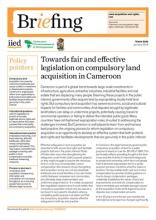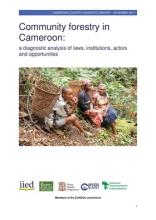/ library resources
Showing items 1 through 9 of 90.Cameroon is part of a global trend towards large-scale investments in infrastructure, agriculture, extractive industries, industrial facilities and real estate that are displacing many people.
This brief study has been produced by the partners of the CoNGOs consortium to share our different knowledge and experience, and to set out a joint understanding of the current state of play in relation to community forestry in Cameroon.
In Cameroon, commercial and infrastructural developments are exerting increasing pressure on land and natural resources, which is in turn exacerbating the risks to the rights of indigenous peoples.
Mapping ecosystem services (ES) increases the awareness of natural capital value, leading to building sustainability into decision-making processes.
Dietary guidelines urge Brazilians to increase their consumption of raw vegetables.
Urban residents’ health depends on green infrastructure to cope with climate change.
With challenges from global climate change, it is imperative to enhance food production using climate-smart technologies and maximize farm efficiency.
The global food market makes international players intrinsically connected through the flow of commodities, demand, production, and consumption. Local decisions, such as new economic policies or dietary shifts, can foster changes in coupled human–natural systems across long distances.
The growing numbers of land change models makes it difficult to select a model at the beginning of an analysis, and is often arbitrary and at the researcher’s discretion.
Paginação
Land Library Search
Through our robust search engine, you can search for any item of the over 73,000 highly curated resources in the Land Library.
If you would like to find an overview of what is possible, feel free to peruse the Search Guide.




